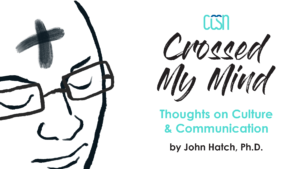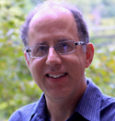 Column title: Crossed My Mind: Thoughts on Culture and Communication
Column title: Crossed My Mind: Thoughts on Culture and Communication
Column entry: Putting Critical Race Theory (CRT) in The Frame
By John Hatch, Ph.D.
Eastern University (retired)
CCSN Senior Fellow
Column Description: As Christians, we are called to have the mind of Christ. This goes against the grain of our social and cultural conditioning. We seek personal or political advancement; Christ seeks the lost and the least. We grasp for cultural ascendency; Christ descends to the cross of love. This column is dedicated to thinking about culture and communication under the sign of the cross.
July 2023 / June 2023 / May 2023 / April 2023 / March 2023 / February 2023 / January 2023 / December 2022 / November(2) 2022 / November 2022 / October 2022 / August-September 2022 / June-July 2022 / January 2022 / December 2021 / October-November 2021
July 24, 2023
Putting Critical Race Theory (CRT) in The Frame
These days, we hear much fearful rhetoric about the apparent threat posed to our national fabric by Critical Race Theory (CRT). Admittedly, “Critical” + “theory” + “race” can sound scary, and anything that suggests our country’s underlying structures are corrupted can feel threatening.
But . . . what if the problem is not really CRT, but how it is being framed?
To use a medical analogy: chemicals that are bad for a healthy body can serve as essential life-saving treatment for someone with leukemia. The enemy is not chemotherapy, but cancer; and the real danger lies not in administering a strong remedy, but in doing so improperly—or rejecting it out of hand.
What if CRT is like that—strong medicine for a body politic whose bones are being subtly eaten away by a persistent cancer of racism? What if removing the tumors of segregation and discrimination, while necessary, did not eradicate the cells of racialization infecting society’s systems? If it were cancer, wouldn’t we seek further treatment? And what if the Great Healer himself sees that we need this medicine as part of a holistic program of wellness?
I think this analogy substantially captures what Robert Chao Romero and Jeff M. Liou are trying to say in their new book, Christianity and Critical Race Theory: A Faithful and Constructive Conversation. More a reorientation than a primer, the book frames CRT within the holistic biblical metanarrative of Creation, Fall, Redemption, and Consummation (which the authors divide among themselves in individually authored chapters). This framing helps us see where CRT mirrors some of the revelatory insight of Scripture, where it fails to reflect the light of revelation, and how it can serve as an essential part of working toward wholeness in the Church and society.
Regarding Creation, Chao Romero focuses on the idea that each people and culture is distinctively gifted by their Creator, and these gifts are welcomed into the new creation. In fact, the book begins and ends with the image presented in Revelation 21:26, where “the glory and honor of the nations” are brought into the New Jerusalem. Chao Romero introduces CRT’s concept of “community cultural wealth,” according to which cultures should not be defined by their relative deficits, but rather appreciated for their unique cultural capital: assets such as social/community networks, languages and dialects, family connections and heritages, resiliency in the face of adversity, and resources for resisting oppression—as well as distinctive traditions, foods, arts, and distinct lenses and perspectives on the world. From a biblical perspective, when we fail to value such cultural wealth or cling to the assumed superiority of our own culture, we dishonor the Creator. CRT can expose ways in which we have fallen into that trap.
In his chapter on the Fall, Liou unpacks the multi-layered and pervasive nature of sin. A central tenet of Critical Race Theory is that racism has been baked into society from the outset through laws, institutions, and cultural practices (e.g., redlining), so that unjust racial advantages/disadvantages have become “normal.” For the authors, this is an instance of what Scripture says about sin: it is woven in and through humanity and comprises our normal way of operating. Citing Christian thinkers from Tertullian, Augustine, and Aquinas to Barth, Niebuhr, and Rahner, as well as theologians of color and non-western cultures, Liou shows that the biblical understanding of sinfulness encompasses the community as well as the individual, systems as well as actions, and the legacy of the past as well as present intentions. The Church has long believed that Christian sanctification involves an ongoing process of confession, repentance, and repair, both collectively and individually. Why should the sin of racism be any different?
This brings us to Redemption. Given Christ’s reconciling work on the cross, Chao Romero highlights how the Holy Spirit has moved the Church and its institutions to work out redemption from the sinfulness of racial exclusion/inequity in practice and structure. As a model, he invokes Acts 6:1-7. In this account from the early Church, the needs of an outsider group (Hellenized Jews, whose everyday language and culture were Greek) were being overlooked by the insider group (Hebraic Jews). When the former complained about this unequal treatment, the Hebraic apostles did not appeal to an ideal of “culture-blindness” or ask why the Hellenists were stirring up discontent and division; rather, they acknowledged the problem and empowered the Hellenists to appoint their own leaders to address the issue. This model fits the pattern of the Spirit’s work throughout the book of Acts, proactively bringing ethnic/cultural outsiders into the Church as full insiders rather than second-class citizens.[i]
Chao Romero argues that the Holy Spirit is doing similar work today by bringing a huge influx of ethnically and culturally diverse people into the United States, including our churches, seminaries, nonprofits, and Christian colleges and universities. In fact, he refers to this phenomenon as a kind of “dress rehearsal” for the multicultural gathering in the New Jerusalem.[ii] He discusses ways in which leaders of color are changing the face of seminary education by developing forms that optimally serve their populations, thus better serving the whole church. This supports CRT’s voice of color thesis—the idea that “we people of color are in the best position to understand our own racialized experiences in the United States and to craft solutions.”[iii] On the other hand, reactionary colorblindness resists the idea of intentionally raising up voices of color within an organization. While such race-neutrality may be well-intentioned, it is a deficient response to the racialized legacy of our society and churches, since it tends to sustain the pre-established (Eurocentric) sense of “normal” and pressure people of other cultures and colors to check their cultural wealth at the door.
Putting a picture into a new frame can help us to see it in a better light. It may also enable us to notice gaps and flaws; and that is the case with Christianity and Critical Race Theory. In view of Scripture’s vision of Consummation, Chao Romero and Liou see CRT falling short. They worry that it lacks Martin Luther King Jr’s hopeful vision of Beloved Community grounded in the unfailing love of God. If a deep-structure critique of pervasive human sin—in this case, racism—is not offset by the kind of prophetic hope found in Scripture, and especially in Black churches and other churches of color—people are left with a demoralizing “discourse of death.”[iv] The biblical eschatology, in contrast, inspires Christ-followers to overcome the crushing powers of sin in human society through creative suffering, joyfully anticipating the ultimate triumph of God’s beloved community.
And this brings me back to the analogy with which I began. CRT, like chemo, does not give life—only Christ does that—but it can help save the body politic from mortal illness. Working to address systemic racism may be uncomfortable, even painful, but when we place our hope in the Great Healer, we needn’t suffer in vain.
And what of human healers/experts? Physicians may have differing opinions regarding an accurate diagnosis or optimal treatment for a given case of cancer—and some make errors or have poor bedside manners—but that does not mean we should reject the study and practice of oncology. The same could be said of thinkers, activists, and trainers who work with CRT. For instance, Liou admits that “some trainings and trainers weaponize guilt and end up exacerbating personal and ideological divides;” yet he also notes that this goes against the grain of CRT’s primary concern with racism in systems and structures inherited from the past (rather than personal attitudes and actions in the present).[v]
Of course, good health consists of more than just being cancer-free, and a healthy culture requires more than just eliminating racism. We need a holistic program of wellness. This is where the Church has a great opportunity: the Holy Spirit fills us not only with conviction of sin, but also divine grace, wisdom, the exercising of Christlike character in love, and a balanced diet of gifts and voices from across the diverse Body of Christ.
What if, instead of fearing (and smearing) CRT, we approached it in the Spirit and wisdom of Christ? What if we learned from its insights, recognized its shortcomings, and combined corrective racial justice work with a full program of spiritual wellness, motivated by love?
* The views of any CCSN columnists are their own, and do not necessarily represent the views of the CCSN. We invite and embrace a wide range of views and critiques on important communication and cultural issues from a Christian perspective. The CCSN is a community of Jesus followers who study communication. We do not support or promote a particular social, political, or denominational agenda.
Notes
[i] For more on the Spirit’s work in this regard, see my May 2023 column.
[ii] Robert Chao Romero and Jeff M. Liou, Christianity and Critical Race Theory: A Faithful and Constructive Conversation (Grand Rapids: Baker Academic, 2023), 99.
[iii] Chao Romero and Liou, Christianity and Critical Race Theory, 108.
[iv] Chao Romero and Liou, Christianity and Critical Race Theory, 153-55.
[v] Chao Romero and Liou, Christianity and Critical Race Theory, 84-85.

